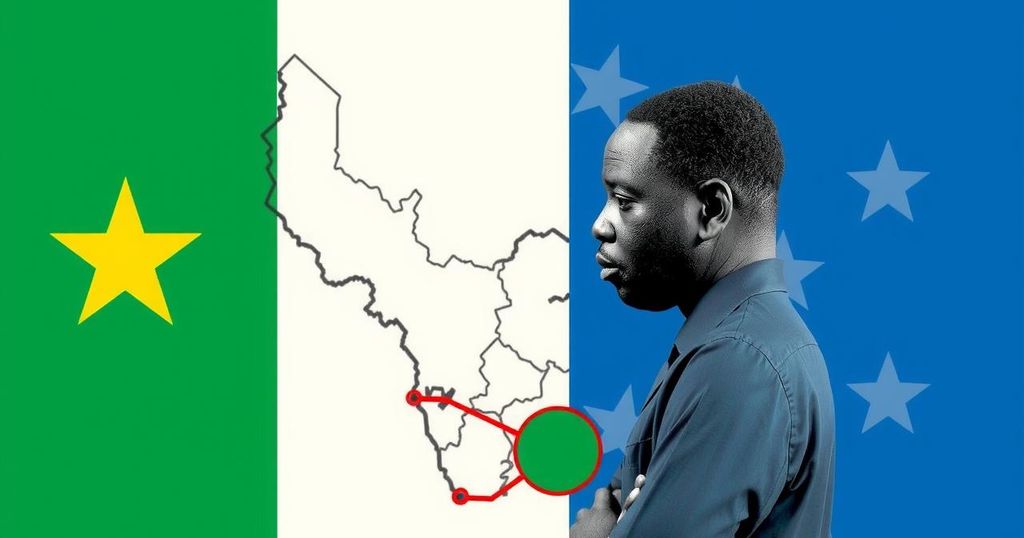The upcoming elections in Guinea-Bissau reveal significant challenges for the media, including dependency on political financing, exorbitant licensing fees, and threats to press freedom. International support is vital, yet many journalists face increased governmental pressures and intimidation efforts, complicating their roles during this critical electoral period.
As the November 2nd Election Day approaches in Guinea-Bissau, media organizations and politicians alike are gearing up for a contentious campaign period. The intense atmosphere surrounding the elections presents numerous logistical and ethical challenges for journalists, who have started drafting proposals for international support, particularly from the United Nations Development Program (UNDP). Given the chronic underfunding of media outlets in Guinea-Bissau, these proposals often necessitate requests for per diem allowances to cover essential costs such as transportation, accommodations, and communication for journalists. This dependence on political parties or candidates for financial assistance could potentially compromise journalistic integrity, prompting an increasing reliance on support from international and regional organizations to maintain impartiality. While the UNDP has historically provided some financial assistance to media organizations in Guinea-Bissau, the support level fluctuates. During the recent parliamentary elections, several media outlets, including notable radio stations like Sol Mansi and Jovem, and newspapers such as O Democrata and Capital News, received approximately $2,500 each. In tandem with funding, the UNDP has been facilitating civic education in collaboration with the National Elections Commission and local media channels. However, the Union of Journalists and Media Technicians has expressed frustration over a lack of additional support from international bodies, including the EU and ECOWAS. The political terrain in Guinea-Bissau is also marred by the pervasive influence of drug trafficking and organized crime, exacerbating the already strained relationship between the government and the parliament. Voter concerns span several urgent social issues, including rising living costs and inadequate access to healthcare and education. Meanwhile, the government has imposed severe licensing fees on private media organizations, demanding $5,000 to allow continued broadcasting, a figure deemed exorbitant by many media representatives. In response, several media organizations have proposed a revised fee structure, requesting a reduction to $3,000 for commercial stations and a one-time payment of $500 for community radio stations, acknowledging their critical role in local communities. This proposal remains without feedback from the government. Amidst this unfolding scenario, four political parties and three coalitions are preparing for the electoral clash scheduled for November 24th. The ongoing divisions within the political framework, particularly between President Umaro Sissoco Embalo and parliament, alongside internal conflicts within major political factions, continue to generate a climate rife with corruption, as highlighted by Freedom House, which noted widespread corruption and links to drug trafficking among government and military officials. Moreover, media freedom comes under threat as evidenced by the intimidation tactics employed against journalists. For instance, incidents involving armed intrusions into media offices, notably at Radio Capital FM, and the physical aggression faced by photojournalists, have raised alarm amongst watchdog organizations. Reports suggest a systematic attempt to suppress the media narrative within the country, culminating in attempts to forcibly close down opposition-aligned stations and restrict journalists from covering significant events. Conclusively, the landscape for journalists in Guinea-Bissau is deteriorating as governmental pressures increase, and vital information becomes increasingly inaccessible to the populace. The upcoming elections symbolize not only a pivotal moment for political representation but also for safeguarding media freedom and integrity in the nation.
Guinea-Bissau is currently on the brink of a critical electoral phase, marked by elections set for November 24th. The media environment in the country is fraught with challenges stemming from inadequate financial resources, heightened governmental pressure, and pervasive corruption linked to organized crime. The reliance of media outlets on international funding and the emergent authority of drug traffickers create an atmosphere detrimental to journalistic freedom and independence. As multiple political parties prepare for elections amidst these adversities, the role of the media remains crucial in shaping public awareness and political discourse.
In summary, the escalating challenges faced by the media in Guinea-Bissau underscore a complex interplay of political, economic, and social factors that threaten journalistic independence and freedom of expression. As elections draw near, the urgent need for a transparent and supportive environment for the media is paramount to ensure that citizens receive accurate and objective information, thereby upholding the foundations of a democratic society.
Original Source: www.voanews.com






